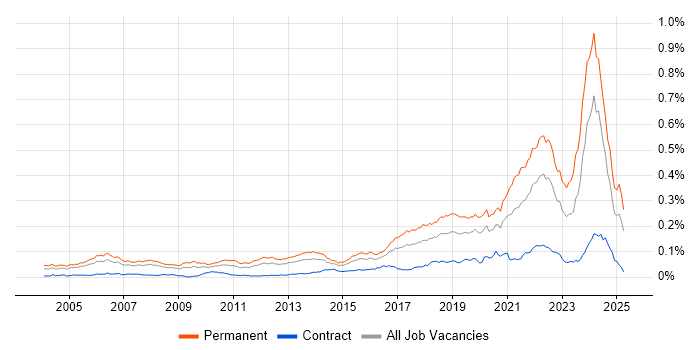Lead Software Engineer
UK
The median Lead Software Engineer salary in the UK is £95,000 per year, according to job vacancies posted during the 6 months leading to 16 May 2025.
The table below provides salary benchmarking and summary statistics, comparing them to the same period in the previous two years.
| 6 months to 16 May 2025 |
Same period 2024 | Same period 2023 | |
|---|---|---|---|
| Rank | 543 | 281 | 628 |
| Rank change year-on-year | -262 | +347 | -62 |
| Permanent jobs requiring a Lead Software Engineer | 169 | 1,022 | 372 |
| As % of all permanent jobs advertised in the UK | 0.30% | 1.03% | 0.37% |
| As % of the Job Titles category | 0.34% | 1.09% | 0.41% |
| Number of salaries quoted | 159 | 264 | 243 |
| 10th Percentile | £66,450 | £60,000 | £55,000 |
| 25th Percentile | £76,250 | £68,438 | £63,750 |
| Median annual salary (50th Percentile) | £95,000 | £85,000 | £82,000 |
| Median % change year-on-year | +11.76% | +3.66% | +5.81% |
| 75th Percentile | £115,000 | £125,000 | £110,000 |
| 90th Percentile | £120,500 | £153,750 | £122,500 |
| UK excluding London median annual salary | £80,000 | £70,000 | £66,750 |
| % change year-on-year | +14.29% | +4.87% | +2.69% |
All Permanent IT Job Vacancies
UK
For comparison with the information above, the following table provides summary statistics for all permanent IT job vacancies. Most job vacancies include a discernible job title that can be normalized. As such, the figures in the second row provide an indication of the number of permanent jobs in our overall sample.
| Permanent vacancies in the UK with a recognized job title | 50,303 | 93,916 | 91,216 |
| % of permanent jobs with a recognized job title | 90.61% | 94.69% | 91.48% |
| Number of salaries quoted | 27,096 | 67,168 | 57,442 |
| 10th Percentile | £29,750 | £28,500 | £32,500 |
| 25th Percentile | £41,250 | £38,500 | £45,000 |
| Median annual salary (50th Percentile) | £56,000 | £52,500 | £60,000 |
| Median % change year-on-year | +6.67% | -12.50% | - |
| 75th Percentile | £73,886 | £71,250 | £80,559 |
| 90th Percentile | £96,250 | £90,000 | £100,000 |
| UK excluding London median annual salary | £51,645 | £50,000 | £53,000 |
| % change year-on-year | +3.29% | -5.66% | +5.64% |
Lead Software Engineer
Job Vacancy Trend
Job postings that featured Lead Software Engineer in the job title as a proportion of all IT jobs advertised.

Lead Software Engineer
Salary Trend
3-month moving average salary quoted in jobs citing Lead Software Engineer.
Lead Software Engineer
Salary Histogram
Salary distribution for jobs citing Lead Software Engineer over the 6 months to 16 May 2025.
Lead Software Engineer
Top 15 Job Locations
The table below looks at the demand and provides a guide to the median salaries quoted in IT jobs citing Lead Software Engineer within the UK over the 6 months to 16 May 2025. The 'Rank Change' column provides an indication of the change in demand within each location based on the same 6 month period last year.
| Location | Rank Change on Same Period Last Year |
Matching Permanent IT Job Ads |
Median Salary Past 6 Months |
Median Salary % Change on Same Period Last Year |
Live Jobs |
|---|---|---|---|---|---|
| England | -5 | 151 | £95,000 | +11.76% | 157 |
| UK excluding London | -238 | 100 | £80,000 | +14.29% | 100 |
| London | +29 | 66 | £110,000 | -18.52% | 85 |
| Work from Home | +45 | 54 | £87,500 | -7.89% | 89 |
| North of England | +49 | 42 | £90,500 | +29.29% | 36 |
| North West | -2 | 25 | £106,500 | +52.14% | 24 |
| South West | +79 | 16 | £83,750 | +24.07% | 4 |
| Yorkshire | +73 | 15 | £80,000 | +17.65% | 8 |
| Midlands | +54 | 15 | £67,500 | -20.59% | 13 |
| South East | +55 | 12 | £92,500 | +23.33% | 36 |
| Wales | - | 11 | £77,500 | - | 1 |
| West Midlands | +48 | 9 | £67,500 | -20.59% | 1 |
| East Midlands | +31 | 6 | £70,000 | -26.32% | 11 |
| Scotland | -125 | 4 | £122,773 | +40.31% | 6 |
| North East | +46 | 2 | £75,000 | +1.35% | 5 |
Lead Software Engineer Skill Set
Top 30 Co-occurring Skills and Capabilities
For the 6 months to 16 May 2025, Lead Software Engineer job roles required the following skills and capabilities in order of popularity. The figures indicate the absolute number co-occurrences and as a proportion of all permanent job ads featuring Lead Software Engineer in the job title.
|
|
Lead Software Engineer Skill Set
Co-occurring Skills and Capabilities by Category
The follow tables expand on the table above by listing co-occurrences grouped by category. The same employment type, locality and period is covered with up to 20 co-occurrences shown in each of the following categories:
|
|
||||||||||||||||||||||||||||||||||||||||||||||||||||||||||||||||||||||||||||||||||||||||||||||||||||||||||||||||||||||||||||||
|
|
||||||||||||||||||||||||||||||||||||||||||||||||||||||||||||||||||||||||||||||||||||||||||||||||||||||||||||||||||||||||||||||
|
|
||||||||||||||||||||||||||||||||||||||||||||||||||||||||||||||||||||||||||||||||||||||||||||||||||||||||||||||||||||||||||||||
|
|
||||||||||||||||||||||||||||||||||||||||||||||||||||||||||||||||||||||||||||||||||||||||||||||||||||||||||||||||||||||||||||||
|
|
||||||||||||||||||||||||||||||||||||||||||||||||||||||||||||||||||||||||||||||||||||||||||||||||||||||||||||||||||||||||||||||
|
|
||||||||||||||||||||||||||||||||||||||||||||||||||||||||||||||||||||||||||||||||||||||||||||||||||||||||||||||||||||||||||||||
|
|
||||||||||||||||||||||||||||||||||||||||||||||||||||||||||||||||||||||||||||||||||||||||||||||||||||||||||||||||||||||||||||||
|
|
||||||||||||||||||||||||||||||||||||||||||||||||||||||||||||||||||||||||||||||||||||||||||||||||||||||||||||||||||||||||||||||
|
|
||||||||||||||||||||||||||||||||||||||||||||||||||||||||||||||||||||||||||||||||||||||||||||||||||||||||||||||||||||||||||||||
